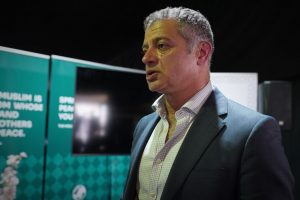
Interview With Dana Aboul-Jabine (Campaign Against Arms Trade Spokesperson)
Sarah Malik, Chicago, USA
The secrets of the arms trade remain mostly unknown to the public. Whist many nations publicly proclaim to promote peace and harmony in the world, paradoxically they are also responsible for selling weapons of mass destruction worth millions to other nations. These weapons are then used by the buying nations or organisations in local, regional and civil wars and conflicts or to violently suppress or harm people, leading to the deaths and injuries of scores of innocent citizens. To uncover the realities of the implications of the global arms trade on the world today, The Review of Religions conducted an interview with CAAT, The Campaign Against Arms Trade, an organisation that has been nominated for the 2021 Nobel Peace Prize. A UK-based organisation, CAAT is dedicated to ending international arms trade, and in 2012, were awarded the Right Livelihood Award (which is often referred to as the Alternative Nobel Prize). Sarah Malik from The Review of Religions’ The Existence Project spoke to Dana Aboul-Jabine from CAAT to learn more. This particular interview focuses on the Middle East, especially Palestine-Israel and Yemen.
[Views expressed in this interview are solely those of the interviewee/CAAT and do not necessarily reflect the views of The Review of Religions. This interview has been edited for clarity and length.]
Sarah Malik: Congratulations on CAAT’s nomination for the Nobel Peace Prize! Please tell us about the efforts your organisation was nominated for.
Dana Aboul-Jabine: We were nominated by the American Friends Service Committee, a Quaker organisation. As previous winners of the Nobel Peace Prize, they can nominate organisations that they think adhere to those same ethics. They nominated us specifically for the work we’re doing with the Saudi campaign with taking the UK government to courts over the supply of UK weapons for use in the war in Yemen. The way they presented it, was that they wanted to raise awareness of organisations like ours who are trying to challenge governments to stop their arms trade as it has detrimental effects on human rights. We were jointly nominated, alongside our friends at Mwatana for Human Rights. They’re a Yemeni based organisation and they’ve been supporting us with the court case against the UK government.
Sarah Malik: Given the situation in Palestine and other similar unfortunate events, such as in Yemen, are happening around the globe – how can CAAT take such a heavily layered issue and tackle it from a legal perspective?
Dana Aboul-Jabine: We’re doing a lot of work on trying to explain the intersectionality of the arms trade. We want to explain to people how the arms trade profits from borders migration. The Arab Spring has led to the largest migrant wave since World War II. The increase in militarised borders across the world, equipped with UK-made technologies and war ships, has given arms manufacturers another way to profit from the misery of civilians. If able to flee from UK-made bombs, civilians are then subjected to surveillance and border fences made by the same UK companies under the guise of ‘security’ in the shape of patrol ships, drones, and razor wire fencing
It’s purposely a messy business so it is a challenge for us when it comes to the court case, so we must be very specific. The moral argument doesn’t hold any weight in court, unfortunately.
CAAT is challenging the government sales of weapons to Saudi Arabia and it was based on reports from numerous reputable sources that Saudi forces have violated international humanitarian law in their bombardment. Under the EU, there’s criterion 2C of the consolidated EU and national arms export licensing criteria. The export licenses should not be granted if there is a clear risk that the equipment to be exported might be used in a serious violation of international humanitarian law.
That’s how CAAT took the government to court. It was saying there is clear evidence – as supported by the UN’s report – that stated that countries providing arms to Saudi Arabia are potentially ‘aiding and assisting’ war crimes by the country’s forces in Yemen. One of the ways they try to argue it is through the ambiguity of the statement a ‘clear risk that equipment might be used’. It’s purposefully ambiguous.
This is how basically we bought this legal action against the government. We basically queried the regulations that supported their sales. In 2019 we won the case and the High Court said that it was irrational and unlawful for the export licenses to have been issued without making at least some assessment as to whether or not past incidences, amounted to breaches of international human rights law. The court demanded that the government do a review of all their sales to ensure that there weren’t incidents. The government did this review and said that human rights abuses amounted to ‘isolated incidents’ and therefore resumed sales.
The court had barred them from making anymore sales, and yet the government continued. Regardless, we are now taking the government back to court, gaining approval by the Supreme Court to proceed saying that we don’t think that their review was good enough. We want to demand that they stop all sales.
It’s incredibly tricky. There’s one other case that we are involved in which is with the International Criminal Court in The Hague. CAAT is part of a coalition alongside other European and Yemeni groups. And we’ve submitted a dossier, which basically is asking the ICC to investigate European governments and arms company officials and arms company officials about their roles in perpetuating abuses of human rights in Yemen. We’re now taking it to the arms companies and those working for potentially aiding and abetting war crimes in Yemen.
It’s one thing to take the government to court. But when it’s individuals or when it’s individuals from a company, it immediately starts to affect people at a much more direct level.
Sarah Malik: What historical conflicts escalated to cause the current feud between Palestine and Israel?
Dana Aboul-Jabine: The occupation of Palestine in 1948, the subsequent, illegal annexation of land, abuses of human rights, crimes of apartheid and persecution by the Israeli state are the historical conflicts that have led to today’s crisis.
It is vital to remember that Palestinians live each and every day under a cycle of violence and persecution by the Israeli state, starved of their rights to healthcare, water, food and freedom of movement, where children are imprisoned with impunity, houses raided and raised. And so, the recent cycle of violence that has grabbed the media’s attention is a normality for Palestinians.
The situation these past couple months escalated as a result of severe restrictions and state violence from Israeli authorities on Palestinians gathering to pray during the holy month of Ramadan at Al-Aqsa Mosque. This follows assaults on Palestinian Christians attempting to enter the Holy Sepulchre church during Easter to violent attacks by Israeli nationalist settlers chanting ‘death to Arabs.’
Worshippers also came to the Al-Aqsa compound to peacefully support the residents of Sheikh Jarrah in East Jerusalem – under military occupation since 1967 – who were awaiting an Israeli court ruling that would see them forcibly evicted from their homes which would be given to Israeli settlers, in violation of international law and a move that the United Nations has described as a possible war crime.
In protesting against the planned evictions as well as 50 years of flagrant and daily abuses of human rights, hundreds of Palestinians were assaulted by Israeli forces who stormed the Al-Aqsa compound, many using tear gas and rubber coated, steel bullets. Human rights monitors and reporters confirming cases of Palestinians who have lost eyes as a result of the attacks, and several with severe head injuries.
Today, the Gaza Strip is home to a population of approximately 1.9 million Palestinians, which includes 1.3 million refugees. Blockaded by Israel, this 362km2 is one of the most densely populated areas in the world.
Israel maintains control over Gaza’s airspace and territorial waters and prevents the movement of Palestinians and essential goods from entering – including medical equipment, access to food and water as well as building construction equipment – resulting in over 56% of the population languishing in poverty.
Sarah Malik: It appears countries like many countries, including the USA and the UK are standing in solidarity with Palestine but yet they have been complicit in exporting arms to Israel. Can you describe the flow of arm supplies?
Dana Aboul-Jabine: There has been a great flood of support over the past several weeks from the citizens of both the UK and USA, with a surge of public support from celebrities and US lawmakers speaking out against the Israeli bombardment.
However, the powers in Washington and Downing Street continue to parrot the same, dangerous statements that infer a conflict between two sides and ignore the occupation and Israel’s violations of Article 49 of the Geneva Convention that states that: ‘The Occupying Power shall not deport or transfer parts of its own civilian population into the territory it occupies.’ It also prohibits the ‘individual or mass forcible transfers, as well as deportations of protected persons from occupied territory’ and therefore, Israel’s policy of settling its civilians in occupied Palestinian territory and displacing the local population contravenes fundamental rules of international humanitarian law.
Since May 2015, the UK has licensed over £400 million worth of arms to Israeli forces, including:
- £183 million worth of ML22 licences (military technology)
- £104 million worth of ML10 licences (aircraft, helicopters, drones)
- £20 million worth of ML4 licences (grenades, bombs, missiles, countermeasures)
- £4.6 million worth of ML6 licences (armoured vehicles, tanks)
- £1.9 million worth of ML3 licences (ammunition)
- £1 million worth of ML1 licences (small arms)
These arms sales do not just provide military support – they also send a clear sign of political support for the daily abuse and violence that is central to upholding the occupation.
Sarah Malik: There is often a lot of international outcry over the Palestine and Israeli conflict with very little results. How can this be harnessed to resolve the situation?
Dana Aboul-Jabine: The word conflict implies that there are two sides, on equal footing and places an equal amount of blame on the Palestinians as it does on Israel. The correct words to use are ‘colonisation’ ‘military occupation’ ‘land theft’ ‘ethnic cleansing’ and ‘apartheid’.
In order to fully understand the actual global interest in resolving the occupation and ensuring Palestinians have access to the same human rights that Israelis do, one only needs to consider the countries that voted against or abstained from the United Nations Human Rights Council resolution to investigate human rights violations during the bombardment of Gaza, namely the largest exporters of weapons to Israel including the UK, Italy, Germany and France.
It is therefore imperative to understand Israel’s arms trade and the part it plays in maintaining the occupation.
Israel is one of the world’s leading arms exporters. Very little official information is available on Israeli arms exports, but annual figures for arms export orders are provided by the Ministry of Defence (the MOD). Israel’s arms export orders were worth $7.2 billion in 2019. According to the MOD figures, 41% of Israeli defence exports in 2019 were to Asia and the Pacific, 26% to Europe, 25% to North America, and 4% to Latin America and Africa. The total was lower than the $9.2 billion recorded in 2017, boosted by a $2 billion order from India, who are by far Israel’s biggest arms customer, for the Barak-2 missile system, and slightly down on the $7.5 billion recorded in 2018.
One area of Israeli arms sales that has increased is in the area of surveillance technology, which has been used by numerous repressive regimes to spy on political dissidents and journalists.
Israel’s arms export customers include Myanmar, where they have dealt with leading military figures associated with the genocide against Myanmar’s Rohingya population. Recent sales to Myanmar include naval patrol boats fitted with Elbit remote weapons stations, which continued to be delivered as the Myanmar armed forces were being accused of war crimes. According to an expert from Amnesty International, Israel may be continuing to supply surveillance technology to the Myanmar regime in 2021. Israel also sells considerable quantities of small arms and light weapons (SALW) to many African countries, and Israeli weapons, brokers, and trainers, have shown up in several African conflict zones.
Israel uses the occupation and ongoing Palestinian resistance to justify their current spending of $2,508 per capita and allocation of 12% of government spending to ‘defence’ (Stockholm International Peace Research Institute data 2020). Israel has therefore been able to place itself as the 12th largest arms supplier in the world, a staggering feat given the country’s size.
Sarah Malik: Does CAAT have plans to help de-escalate the dispute or further expose the realities of how arms exports from more powerful countries are encouraging the violence in various countries?
Dana Aboul-Jabine: CAAT works to end both global arms trade and militarism with a focus on issues that can be affected by campaigning and solidarity work in the UK. The UK is one of the world’s largest arms exporters, arming some of the world’s most repressive regimes including Saudi Arabia and Israel and we continue to supply arms to countries who are in the midst of conflict and wars.
CAAT. therefore, works towards exposing the sales of weapons with the ultimate aim of stopping them for good. We work with campaigners and organisations across the country, including our campaigns to Stop Arming Saudi and to Stop the Arms Trade with Israel and our recent work to hold our government accountable for licensing the sales of so called ‘crowd control equipment’ to the US, the type of which was used to violently attack protesters and journalists.
CAAT is committed, as part of a wider coalition of groups, towards ending Israel’s occupation of Palestine, with a focus on exposing the role that the arms trade has in perpetuating the occupation and misery of Palestinians.
CAAT is proud to be amongst a group of European and Yemeni groups that submitted a dossier to the International Criminal Court in The Hague, asking them to investigate both the European government as well as arms company officials for potentially aiding and abetting war crimes in Yemen. Furthermore, CAAT’s legal challenge over the UK government’s supply of UK weapons for the war in Yemen will now proceed to the High Court.
Both these actions can set a precedent for future actions on the UK arms trade to Israel.
About the interviewer: Sarah Malik, has a degree in Medical Biochemistry and is the recipient of the national American Chemical Society (ACS) award as the top student in the nation for her contribution to research and academic performance in Organic chemistry. Sarah has published and researched on her synthesis of a novel styrene polymer and on signalling pathways triggering GERD and oesophageal cancer. She is a team member of The Existence Project for The Review of Religions.




Add Comment